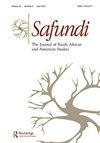我们可以从笈多兄弟身上学到什么
IF 0.2
Q4 AREA STUDIES
Safundi-The Journal of South African and American Studies
Pub Date : 2020-10-01
DOI:10.1080/17533171.2020.1832805
引用次数: 0
摘要
本文从“印度”的角度对南非“国家抓捕”丑闻进行反思。我认为,是印度出生的古普塔兄弟——而不是特朗普总统或祖马总统——为我们提供了一种新的比较研究模式,可以绘制出腐败、权力和影响力的新兴地理区域。本文章由计算机程序翻译,如有差异,请以英文原文为准。
What we can learn from the Gupta brothers
ABSTRACT This article is a reflection on the “Indian” angle of South Africa’s “state capture” scandal. I argue that it is the Indian-born Gupta brothers – rather than Presidents Trump or Zuma – who offer us a model for a new kind of comparative inquiry that maps emerging geographies of corruption, power, and influence.
求助全文
通过发布文献求助,成功后即可免费获取论文全文。
去求助
来源期刊
CiteScore
1.00
自引率
0.00%
发文量
0

 求助内容:
求助内容: 应助结果提醒方式:
应助结果提醒方式:


